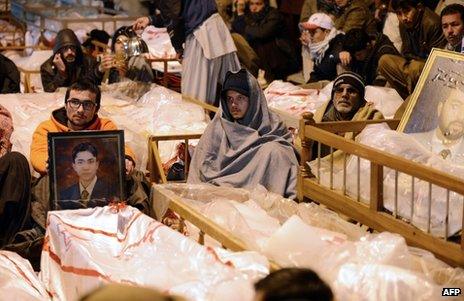Pakistan Shia protest: PM visits Quetta for talks
- Published

The prime minister of Pakistan has arrived in Quetta, where Shia Muslims demanding better security are refusing to bury loved ones killed by bombers.
Raja Pervez Ashraf arrived in the city, capital of the province of Balochistan, after other officials failed to negotiate an end to the protest.
Thousands of Shia have been sitting in the open beside the shrouded bodies of victims of Thursday's attacks.
At least 92 people were killed by bombers said to be Sunni extremists.
The banned militant group Lashkar-e-Jhangvi said it had carried out the bombings.
Security concerns have grown among Pakistan's Shia minority, which makes up about 20% of the country's predominantly Sunni population.
"Quetta has become a killing field and we are protesting to stop target killings," a protester who identified himself as Ali Raza told AFP news agency.
Snooker hall blast
Mr Ashraf was due to meet leaders of the city's Hazara community, to which many Shia belong, a senior government official told AFP on condition of anonymity.
Protesters rejected a delegation led by the Minister for Religious Affairs, Syed Khurshid Shah, which arrived on Saturday.
The worst of Thursday's attacks targeted a snooker hall. A suicide bomber detonated his device and a car bomb was detonated minutes later as police, rescuers and media arrived.
The president of the Shia Conference, Syed Dawood Agha, told the BBC his community would not bury its dead until the army had given an assurance it would take administrative control of the city.
Among the dead was Quetta-based rights activist Irfan Ali, who was reportedly helping those wounded in the first blast.
Balochistan is plagued by a separatist rebellion as well as the sectarian infighting.
The Taliban and armed groups that support them also carry out attacks in the province, particularly in areas near the Afghan border.
- Published11 January 2013
- Published12 January 2013
- Published11 January 2013
- Published4 October 2011
- Published10 January 2013
- Published15 March